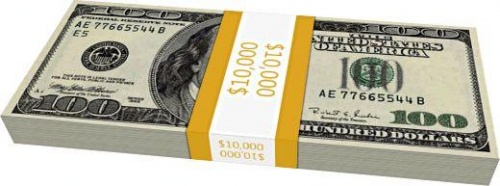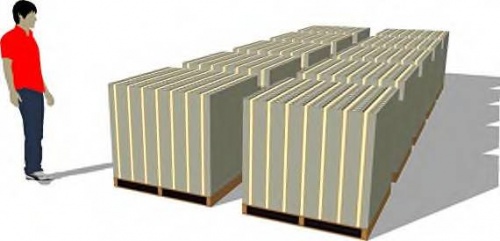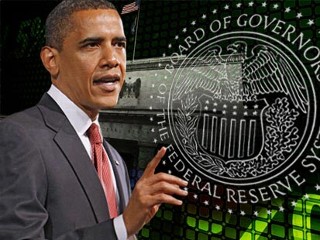Barack Obama has now been president of the most powerful country in the world for over half a year. His swearing in was experienced as a relief - a breath of fresh air following the Bush-Cheney years. In a new series, DeepJournal explores some of the new president's major policy arenas. What is the practice behind the perception of America's new hero, President Barack Obama? In this second part: The economic policy of the Obama Administration.
By Daan de Wit
Translated by Ben Kearney
An important component of President Obama's economic policy consists of the cleaining up of the financial chaos left behind by his predecessor. A key part of this is the bailout: The takeover of a few large financial institutions by the American government and the loaning of money to hundreds of banks. The bailout began under Bush, with his Treasury Secretary Hank Paulson (former CEO of Goldman Sachs). And it went further under Obama, with his Treasury Secretary Timothy Geithner (former president of the New York Federal Reserve Bank). The bailout may cost the American taxpayer more than 23 trillion dollars.
A portion of that amount has already been distributed - not to Main Street, but to Wall Street. Roughly 180 billion went to AIG, which then channeled 13 billion to Goldman Sachs: '[...] the original plan to bail out AIG  was concocted at a meeting held last fall, run by then Treasury Secretary Hank Paulson who, before becoming treasury secretary, had been CEO of Goldman Sachs. Also attending the meeting was Lloyd Blankenfein, the current CEO of Goldman Sachs. Also at the meeting: Tim Geithner, then head of the New York Fed', writes Professor Robert Reich. In the meantime Paulson became $200 million dollars richer, Geithner got to be Secretary of the Treasury, and Goldman seldom sees a loss these days: 'The winning % is what gets me... it's simply impossible'.
was concocted at a meeting held last fall, run by then Treasury Secretary Hank Paulson who, before becoming treasury secretary, had been CEO of Goldman Sachs. Also attending the meeting was Lloyd Blankenfein, the current CEO of Goldman Sachs. Also at the meeting: Tim Geithner, then head of the New York Fed', writes Professor Robert Reich. In the meantime Paulson became $200 million dollars richer, Geithner got to be Secretary of the Treasury, and Goldman seldom sees a loss these days: 'The winning % is what gets me... it's simply impossible'.
The U.S. Federal Reserve distributes the bailout funds, but allows no complete oversight of its activities. This while three-quarters of the American public are in favor of auditing the Federal Reserve. Congressman Ron Paul is now demanding to audit the Fed. On the way he is running right into the White House, which is proposing the exact opposite: 'The Obama plan would give the Federal Reserve new powers to oversee the entire financial system'. An MSNBC anchor says in his introduction of a discussion on Pauls plans [video]: 'The Federal Reserve, of course, having proven itself unreliable at best in monitoring the financial markets over the last couple of years. [...] The Federal Reserve still doesn't think they deserve to be audited. Even as they carry trillions of dollars of assets on their books, held against U.S. taxpayer money'. Ron Paul says of the Fed [video, 3:30]: They are the culprits, they create the bubbles and here we're giving them more power... This is allowing the fox to protect the henhouse.  It just can't work. It's going to make things much worse'. Paul [video, 5:30]: 'The American people were very, very hopeful. That we have a new American president, a young guy making these promises. Now they're saying: 'It looks like it is more of the same'.
It just can't work. It's going to make things much worse'. Paul [video, 5:30]: 'The American people were very, very hopeful. That we have a new American president, a young guy making these promises. Now they're saying: 'It looks like it is more of the same'.
An important question is whether the 23 trillion dollars is a good investment or whether the financial institutions should have simply been allowed to fail. Journalist Bill Moyers wants to know the facts and interviews William K. Black. He is the former Executive Director of the Institute for Fraud Prevention and is now an Associate Professor of Economics and Law at the University of Missouri-Kansas City.
>From the transcript:
'BILL MOYERS: [...] you supported Barack Obama, during the campaign. But you're seeming disillusioned now.
WILLIAM K. BLACK: Well, certainly in the financial sphere, I am. I think, first, the policies are substantively bad. Second, I think they completely lack integrity. Third, they violate the rule of law. This is being done just like Secretary Paulson did it. In violation of the law. [...] it requires them to close these institutions. [...]'. In February Black posed the question: 'Why Is Geithner Continuing Paulson's Policy of Violating the Law?' Financial expert Peter Schiff sums up the problem surrounding the bailout [video, 4:00]: 'The average American is going to see his cost of living rise dramatically and the value of their savings evaporate'.
The sponsoring of the banks by the  Obama Administration does not sit well with investor Jim Rogers. He says in an interview: 'For the people who get the money, George, it is going to make it better for them. But for the rest of the country and the rest of the world... No, it's not going to make things better. It's going to make things worse. We are in perilous times and he doesn't seem to understand that he is making things much worse'. Congressman Alan Grayson: 'Everybody's worst nightmares are now taking place because we are seeing the transfer of literally trillions of dollars of wealth from the taxpayer to the bad banks'. His questions to the Fed have not been answered and 'Bloomberg News is suing the Federal Reserve for this and other information under the Freedom of Information Act (FOIA)'.
Obama Administration does not sit well with investor Jim Rogers. He says in an interview: 'For the people who get the money, George, it is going to make it better for them. But for the rest of the country and the rest of the world... No, it's not going to make things better. It's going to make things worse. We are in perilous times and he doesn't seem to understand that he is making things much worse'. Congressman Alan Grayson: 'Everybody's worst nightmares are now taking place because we are seeing the transfer of literally trillions of dollars of wealth from the taxpayer to the bad banks'. His questions to the Fed have not been answered and 'Bloomberg News is suing the Federal Reserve for this and other information under the Freedom of Information Act (FOIA)'.
Jim Rogers: 'It is astonishing to me that Mr. Obama ran on a platform of change and he's brought in people who caused the problems and are there now supposed to solve the problems'. He is most likely referring to folks such as -
* Treasury Secretary Timothy Geithner - ex-President of the New York Federal Reserve.
* Geithner's chief of staff at Treasury, Mark Patterson - former lobbyist for Goldman Sachs.
* Director of the National Economic Council, Larry Summers - was advisor for financial institutions on Wall Street.
* Deputy National Security Advisor for International Economic Affairs, Michael Froman - 'As a high-ranking Citigroup official, Mr. Froman is one of many potential appointees with ties to the current troubles on Wall Street', writes the New York Times.
* Chairman of the Commodities Futures Trading Commission (CFTC), Gary Gensler - the CFTC should be bringing about the opposite of what the Commodity Futures Modernization Act does, a law that Gensler helped to pass. The CFTC 'oversees $5 trillion in futures and options trading'. Previously Gensler was a partner at Goldman Sachs.
* Head of the Office of Financial Stability, Neel Kashkari - former Vice President of Goldman Sachs in San Francisco. The OFS is the government office that operates TARP (Troubled Assets Relief Program).
* The list is too long to reproduce here in its entirety.
In conclusion the New York Times writes: '[...] almost the entire Obama administration economic team could be said to be made up of followers of so-called Rubinomics. [...] Robert E. Rubin has been a top trader and executive at Goldman Sachs [and] Citigroup, where he served as director and senior adviser'. Rubin is now Chairman of the Council on Foreign Relations. Glenn Greenwald writes: 'Just think about how this works. People like Rubin, Summers and Gensler shuffle back and forth from the public to the private sector and back again, repeatedly switching places with their GOP counterparts in this endless public/private sector looting [...] And the winners -- as always -- are the same Wall St. firms that caused the crisis in the first place while enriching and otherwise co-opting the very individuals Obama chose to be his top financial officials'. 'So "they"--Summers, Gensler, Treasury Secretary Timothy Geithner and their ueber mentor, Rubin--were as wrong as anyone could be. Perhaps such error is human, but aren't there folks out there with a better prospect of getting it right that Obama can rely on?', writes Robert Scheer in The Nation.
It's not only the 'mortgaging of the future' through the spending of governement money on the banks that's catching criticism, but the so-called cash for clunkers program is also under fire. Turn in your old clunker and receive a 4500 dollar rebate on the purchase of a new car.  Good for the economy. It immediately reminded me of my conversations with Albert Spits of the Frédéric Bastiat Institute. The French economist Bastiat is the one who came up with the parabel of the broken window. This theory says that a broken window pane is not a boon to the economy, despite the fact that it causes money to be spent and provides work for someone. For the money that must now be spent on the window could have been spent on something else. In this way you could end up being 'up 1', so to speak, instead of just breaking even.
Good for the economy. It immediately reminded me of my conversations with Albert Spits of the Frédéric Bastiat Institute. The French economist Bastiat is the one who came up with the parabel of the broken window. This theory says that a broken window pane is not a boon to the economy, despite the fact that it causes money to be spent and provides work for someone. For the money that must now be spent on the window could have been spent on something else. In this way you could end up being 'up 1', so to speak, instead of just breaking even.
Of course the owner of the old car receives the government-funded rebate once it stops running. In practice it is for just this reason that the cars end up having to be destroyed. Examples of this can be found online; 'Cash for clunkers: cool!' Analyst Peter Schiff looks on in amazement [video, 1:45]: 'We're taking out clunkers, cars that work, cars that were on the road, that are functioning...  There is no debt, people have no car loans on these cars. And we're destroying them; these are valuable pieces of property. [...] Why are we giving people money to take out a car loan that they didn't have before? [...] The last thing we want is more debt'. He also points out that not all of that money ends up in the U.S. economy. Around half of new cars sold are of non US brands.
There is no debt, people have no car loans on these cars. And we're destroying them; these are valuable pieces of property. [...] Why are we giving people money to take out a car loan that they didn't have before? [...] The last thing we want is more debt'. He also points out that not all of that money ends up in the U.S. economy. Around half of new cars sold are of non US brands.
Steve Forbes, owner of financial publication Forbes Magazine, states in a headline: 'Obama Repeats Bush's Worst Market Mistakes'. Obama fan and billionaire George Soros says: 'I'm afraid that it's too much continuity between the Obama administration and the Bush administration as far as the management of the financial system is concerned'. What is the practice of Obama's economic policy? Banks that don't deserve it are being put on life-support, cars that still run are being destroyed, employees of banks that would no longer be in existence without government bailout money are getting huge bonuses, and on Wall Street profits are even being made on the crisis itself (a billion dollars) by assisting in the break-up of financial insurance companies.

 mail this article
|
mail this article
|
 print
|
print
| 

 was concocted at a meeting held last fall, run by then Treasury Secretary Hank Paulson who, before becoming treasury secretary, had been CEO of Goldman Sachs. Also attending the meeting was Lloyd Blankenfein, the current CEO of Goldman Sachs. Also at the meeting: Tim Geithner, then head of the New York Fed',
was concocted at a meeting held last fall, run by then Treasury Secretary Hank Paulson who, before becoming treasury secretary, had been CEO of Goldman Sachs. Also attending the meeting was Lloyd Blankenfein, the current CEO of Goldman Sachs. Also at the meeting: Tim Geithner, then head of the New York Fed', 
 Obama Administration does not sit well with investor Jim Rogers. He says in an
Obama Administration does not sit well with investor Jim Rogers. He says in an  Good for the economy. It immediately reminded me of my
Good for the economy. It immediately reminded me of my  There is no debt, people have no car loans on these cars. And we're destroying them; these are valuable pieces of property. [...] Why are we giving people money to take out a car loan that they didn't have before? [...] The last thing we want is more debt'. He also points out that not all of that money ends up in the U.S. economy. Around
There is no debt, people have no car loans on these cars. And we're destroying them; these are valuable pieces of property. [...] Why are we giving people money to take out a car loan that they didn't have before? [...] The last thing we want is more debt'. He also points out that not all of that money ends up in the U.S. economy. Around